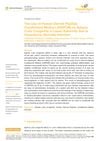 115 citations,
November 2004 in “Brain Behavior and Immunity”
115 citations,
November 2004 in “Brain Behavior and Immunity” Stress increases nerve fibers and immune cell activity in mouse skin, possibly worsening skin conditions.
 August 2024 in “Applied Sciences”
August 2024 in “Applied Sciences” Plant extracts may help prevent or reverse hair graying.
 July 2024 in “Clinical Cosmetic and Investigational Dermatology”
July 2024 in “Clinical Cosmetic and Investigational Dermatology” Non-drug therapies show promise for hair regrowth but need more research.
 February 2024 in “Biomedicines”
February 2024 in “Biomedicines” Hormones like androgens, estrogen, thyroid hormones, and stress hormones can contribute to hair loss, and treatments target these hormonal imbalances.
 81 citations,
June 2014 in “American Journal of Men's Health”
81 citations,
June 2014 in “American Journal of Men's Health” Finasteride can cause lasting sexual, emotional, and cognitive issues, with varying severity.
 32 citations,
September 2018 in “Clinical Obstetrics and Gynecology”
32 citations,
September 2018 in “Clinical Obstetrics and Gynecology” Hormone therapy for transgender females increases the risk of blood clots and requires careful dosing, monitoring, and lifelong management.
 6 citations,
December 2022 in “Cell reports”
6 citations,
December 2022 in “Cell reports” Eating a high-fat fish oil diet caused mice to lose hair due to a specific immune cell activity in the skin linked to a protein called E-FABP.

New treatments for hair loss should target eight main causes and use specific plant compounds and peptides for better results.
 1 citations,
March 2019 in “KnE life sciences”
1 citations,
March 2019 in “KnE life sciences” HDPCM treatment healed a baby's congenital skin defect caused by varicella infection.

Different genes cause Female Pattern Hair Loss compared to male hair loss, and treatments vary, but more research is needed to understand it fully.
 1 citations,
November 2018 in “bioRxiv (Cold Spring Harbor Laboratory)”
1 citations,
November 2018 in “bioRxiv (Cold Spring Harbor Laboratory)” Signals from skin cells controlled by Rac proteins help turn certain precursor cells into white fat cells.
 January 2023 in “Clinical dermatology review”
January 2023 in “Clinical dermatology review” COVID-19 infection may cause hair loss.
2 citations,
August 2022 in “Frontiers in Immunology” Microneedling with betamethasone led to almost complete hair regrowth in severe alopecia areata.
April 2022 in “Journal of Investigative Dermatology” Androgenetic alopecia causes hair thinning due to increased androgen activity, treatable with minoxidil and finasteride.
 8 citations,
April 2017 in “Experimental Dermatology”
8 citations,
April 2017 in “Experimental Dermatology” More plasma leptin means higher baldness risk in men.
 1 citations,
January 2022 in “Open Access Macedonian Journal of Medical Sciences”
1 citations,
January 2022 in “Open Access Macedonian Journal of Medical Sciences” Both platelet-rich plasma and low-level laser therapy effectively treat hair loss with minimal side effects and good cost-benefit ratio.
 August 2023 in “Journal of Cosmetic Dermatology”
August 2023 in “Journal of Cosmetic Dermatology” Using a laser with minoxidil was more effective for hair loss than minoxidil alone.
 January 2020 in “Jornal Vascular Brasileiro”
January 2020 in “Jornal Vascular Brasileiro” Anticoagulant therapy may cause hair loss, especially in women, and stopping the medication can lead to hair regrowth.
1 citations,
December 2022 in “Bioactive Materials” The microneedle patch with quercetin, zinc, and copper effectively promotes hair regrowth for androgenic alopecia.
 1 citations,
January 2006 in “Elsevier eBooks”
1 citations,
January 2006 in “Elsevier eBooks” Cats lose fur due to various reasons, including allergies, infections, genetics, hormones, diet, cancer, stress, and some conditions are treatable while others are not.
 7 citations,
April 2011 in “Expert review of dermatology”
7 citations,
April 2011 in “Expert review of dermatology” The document concludes that patients with skin of color need specialized dermatological care and education to manage unique skin conditions effectively.
 September 2013 in “Experimental Dermatology”
September 2013 in “Experimental Dermatology” The document concluded that stem cells are crucial for skin repair, regeneration, and may help in developing advanced skin substitutes.
Curcuma aeruginosa Roxb. may help treat hair loss by affecting specific biological pathways.
3 citations,
April 2020 in “Medicine” Acupuncture may be a safe and cost-effective treatment for Seborrheic alopecia.
1 citations,
November 2023 in “International journal of molecular sciences” Cannabinoids might help treat skin problems but more research is needed to be sure.
40 citations,
October 2012 in “Dermatologic clinics” More research is needed to understand the genetic causes of Alopecia areata to develop better treatments.
14 citations,
January 2019 in “Advances in experimental medicine and biology” Skin stem cells are promising for healing wounds and skin regeneration due to their accessibility and regenerative abilities.
 16 citations,
December 2001 in “Dermatologic Therapy”
16 citations,
December 2001 in “Dermatologic Therapy” Alopecia areata has a complex genetic basis that was not fully understood as of 2001.
 11 citations,
April 2013 in “Journal of Agricultural and Food Chemistry”
11 citations,
April 2013 in “Journal of Agricultural and Food Chemistry” Monascus helps prevent baldness, prostate issues, and may be a natural alternative to medications.
 46 citations,
February 2016 in “Experimental Dermatology”
46 citations,
February 2016 in “Experimental Dermatology” Genes play a significant role in male-pattern baldness, and understanding them could lead to new treatments and insights into related health issues.






















